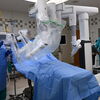
Maine’s fast-changing cannabis industry requires being fleet of feet
 Photo / Fred Field
Nate Burdick, owner and founder of Upward Organics, got into the cannabis business by chance.
Photo / Fred Field
Nate Burdick, owner and founder of Upward Organics, got into the cannabis business by chance.
A dirt road in rural Oxford County winds uphill and opens to a clearing where rows of towering cannabis plants grow, each in its own structure. It’s a low-tech setting for what’s become an innovative cannabis-growing operation.
Nate Burdick, owner and founder of Upward Organics is committed to low-carbon growing practices via outdoor crops and sun-powered greenhouses.
But Burdick didn’t start off in the cannabis industry. The Bentley University business graduate got an office job out of school and after many years of stress, he came to the realization that maybe this wasn’t the path for him.
“Two of my college roommates were caregivers and they asked me if I wanted to come to trim for them. [They asked] ‘Can you water my plants while I’m away?’ And that is how I got into this field,” says Burdick.
Burdick was a caregiver at another plant and fell in love with growing. He bought the property in Porter to start his own business and put a lot of “sweat equity into it,” he says.
Upward Organics was created in 2018. Burdick bought his property in Porter which is off the grid and put a solar mount on it. This was just the beginning.

Saving the environment one plant at a time
Upward Organics grows cannabis outdoors which is believed to be the most sustainable, ethical and economical method for reducing the environmental burden of cannabis production.
They are one of three cultivators in the country that are part of the 1% for the Planet.
“Our mission is to produce the highest quality cannabis possible with the lowest environmental impact,” says Burdick.
Burdick built greenhouses to withstand the drastic Maine temperatures. He uses a mix of solar panels and a wood-burning furnace that heats the greenhouse sediment.
The company is 100% electric. It doesn’t use propane or fossil fuel to heat the property because it wants to offset the carbon footprint with solar power.
While developing the business the first step was installing a water system for his outdoor plants. Burdick installed a Blumat watering system that gives the outdoor plants the water they need instead of getting water at once for a set period of time. This process helps save on water and labor. The system harvests rainwater and has less electrical demand.
In 2021, Burdick began building his greenhouse which he has named Alpha. This greenhouse has 36 plants in production. The plants are grown in open-topped bags.
“We popped a bunch of bags of seeds,” said Burdick. “Our goal is to find females to produce new flower strands with. These are all males, pointing to a bed of plants, we want to use pollen from the best males on some of our other females and make new genetics that only we have, no one else in the world will have these strands.”
To heat the greenhouse Burdick uses hot water from a furnace he put in. The furnace uses wood and not propane. Burdick said they do not cut down trees, they use wood that is “all natural” and has blown down. His neighbor also has a sawmill and drops off pine slabs and rounds.
“There’s a big fire box in here surrounded by 370 gallons of water,” says Burdick pointing inside the furnace. “The water is 173 degrees and there are pipes that run underground that go to Alpha and to our shipping container. When either needs heat, a radiator turns on and blows air across a copper pipe with 185-degree water in it.”
That is not all Burdick uses the sun instead of lights to grow his plants. Most cannabis growers use powerful lights to grow their plants.
“Two weeks from now we will close our black out curtain which is located on top of the greenhouse,” says Burdick. “We will close it at 5 p.m. and the plants will think that it is August or even September because we will only be getting 12 hours of sunlight. They will start to flower even when they aren’t supposed to.”
In the greenhouse which is named Beta he uses a ground to air heat transfer system. The plants inside this greenhouse are in beds unlike Alpha which is in bags.
“Greenhouses obviously produce heat and so this time of year instead of exhausting it outside what we do is pump it underground through a series of tubes and what it does is it the air goes down to 95 degrees and then it comes up at 60 degrees. So, it cools the air in the greenhouse which is good because the plants don’t like it that hot but, also what it does is at night when it gets to let’s say 45-degrees it turns on again. It pushes the cold air down and comes up to 60-degrees. It heats and cools and just uses fans so no wood, no maintenance, nothing.”
The fans inside the greenhouse quick on and the two exhausts warms the soil.
Behind two greenhouses and other outbuildings which are a barn-style building with a drying room, a solventless lab and other workspaces.
One-man operation
Upward Organics is a one-man operation with occasional help from friends and family. “We have a group of retirees come during harvest and we have them bring their campers and they just post up and let us harvest,” says Burdick. “We feed them and entertain them and they just donate time. It’s amazing and so much fun.”
When it comes time to harvest the plants 50% will go to flower “so we will take 50% and put them on hangers in the drying room and trim it as a final product and wholesale it to the stores we work with. Then the other 50% will get flash frozen and put in the freezers out back and then we will make a hash with it.”
In the off season Burdick can be found outdoors in “maintenance mode” with his two dogs Goose and Nemo “I just walk around and whatever needs to be done. Some days there are projects but most of the time I don’t know what I’m doing today,” says Burdick while petting his dogs.
Burdick drives his product out to the stores he works with. Last year he was only working with one dispensary and now he is working with 10.
Mainebiz web partners
Keep your dream of solar power going Nate










1 Comments